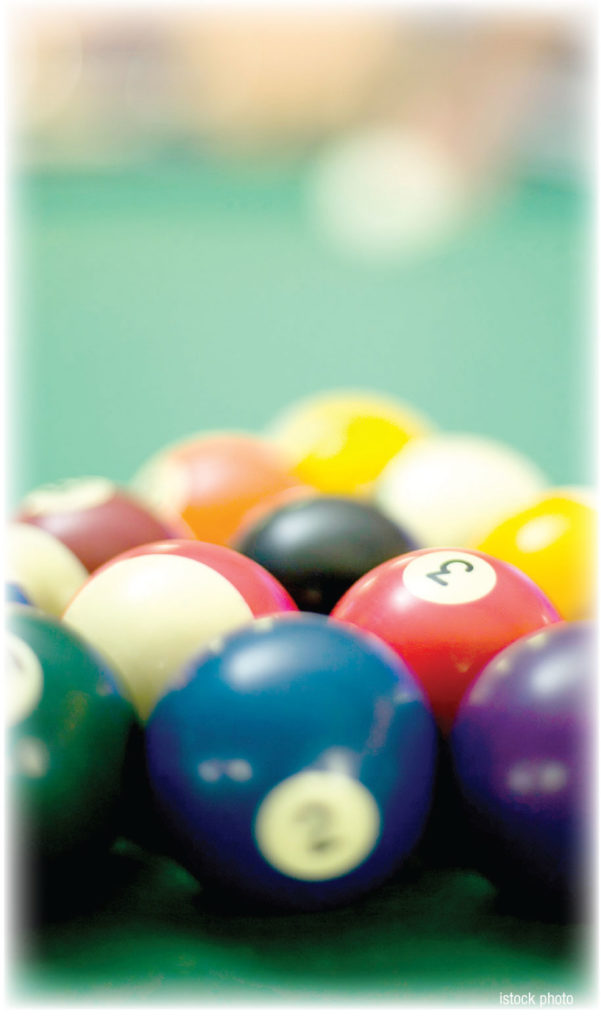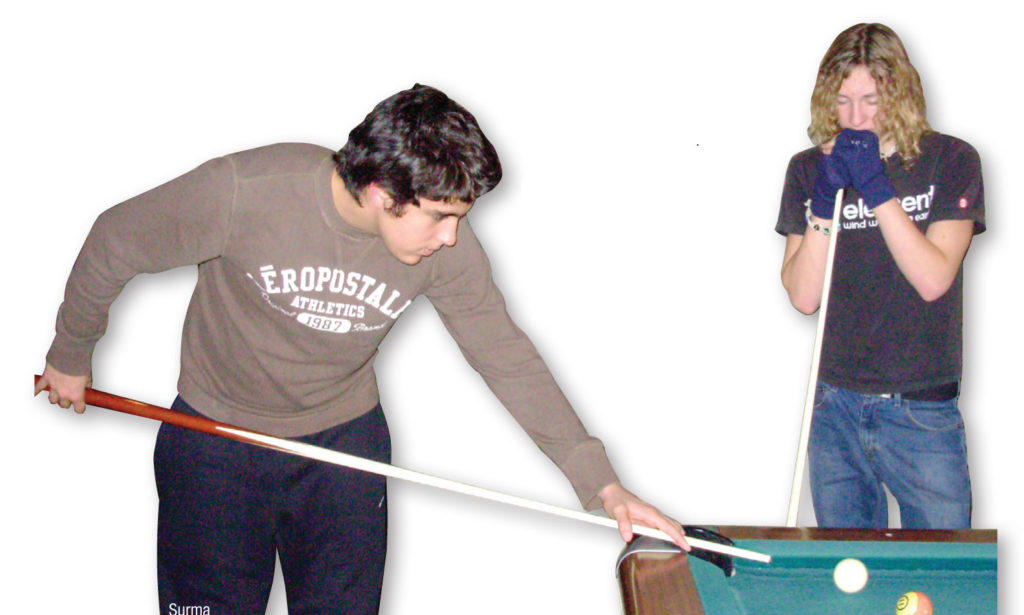View 1: by Felipe Salinas

“Come on, Pedro, let’s go shoot a few games.”
I was dead tired and didn’t really want to go with Juan. It had been a 12-hour day. But we only picked up two channels on our TV.
“Mama, me voy con Juan. I’ll be back later,” I yelled at my mother. We jumped in Juan’s dad’s truck and spun out of the labor camp.
“Man, it was hot today,” Juan said. “How much did you pick?”
“I made my share,” I said. One of the good things about migrating was getting to see other places, though traveling under the camper top in the back of the pick-up truck wasn’t great. This was our way of life, working fields in the north for the summer and back south for the citrus and onions.
“I’m through with that place,” said Juan as we passed the high school just outside of town. “Now that I’m 16, I’m not going back. How about you?”
“I don’t know.” But Juan knew I wouldn’t drop out. My parents wouldn’t let me, even if I wanted to. I was making good grades and keeping up as we moved from one school to another.
We drove into town. Like most of the small towns in the north everything was neater and more perfect than in our colonia back in south Texas.
In Texas, I could be more myself. It was almost like the warmer the climate, the warmer the people. But most of the people in their town didn’t bother us if we took it easy and kept quiet. That’s my approach to life anyway. Keep it nice and quiet; things will work out.
We cruised the pool hall a couple of times, partly to see if anything else was going on in town but mainly to make sure it looked okay for us to go in. Just a couple of cars and a pick-up truck were parked outside. The pick-up truck had a sticker saying District Champs 2006. Probably guys from school.
Most of the local kids tried to be friendly with the migrant kids. Some of them invited us to parties or school dances, but none of us ever went. It’s easy enough to explain that you don’t have time, what with working in the fields after school and trying to catch up with the schoolwork you miss while you are traveling. But how do you explain that you just don’t fit into their world?
The manager knew us by now and called out from the counter, “How’s it going?”
“Okay,” I said, nodding to him as we walked to one of the empty pool tables in the back. While Juan was setting up for a game, I noticed a couple of guys two tables down. I recognized one of them from school — Murphy. He’d been in my class every year we’d been coming north.
Juan broke. I called stripes and made the 11 ball. After I missed the next shot, Juan came on strong making three solids in a row. I noticed between shots the guy with Murphy looking over at us. I made the 9 and 15 balls. Juan cleared the rest of the table, called the 8 ball in the side pocket and made it. We were setting up again when the guy playing with Murphy came over.
“You guys want to try your luck against us?” he said loudly and slowly. He probably thought we didn’t know English very well. I looked at Juan and shrugged my shoulders. Juan nodded and finished setting up the balls.
Murphy came over and joined us. “Hey, what’s up, Pedro?” he said, extending his hand.
“Not much. Work. You know,” I said, shaking hands.
“Yeah, I guess. This is Luke. You’ve probably seen him at school.”
Luke looked over at me while chalking his cue stick. I introduced Juan.
Luke stood beside Murphy and asked, “What will it be? Best of five?”
I didn’t want to stay late because 5 a.m. was wake-up time for us, but Juan jumped in.
“Okay,” said Juan.
“Great!” said Luke. “Since you guys are the, ah, ‘visiting team,’ why don’t we let you break first?”
Juan broke, the rainbow of colors flying in all directions over the table. Luke and Murphy were pretty good, but we were better. Juan gave me advice between shots in Spanish. I didn’t say much. That’s how I like to shoot pool, nice and quiet.
View 2: by Jennifer Rooney

“You break this time, Murph,” Luke said. He glared at our opponents and started racking balls.
Pedro and Juan, two migrant workers about our age, had beaten Luke and me easily in two straight games.
Luke thudded the last three balls in place and lifted the rack. “Don’t screw up,” he muttered as he stood back to give me room to break. “I can’t stand losing to these stupid foreigners.”
“Chill out. Let’s play for fun,” I said. Luke was a good enough guy, but he was very competitive and had an explosive temper.
I launched the cue ball and scattered the balls — a decent break. That’s how I play pool, not great, but decent. Not Luke. He was not used to losing.
Pedro and Juan had been playing each other at the next table when Luke asked, “You guys want to try your luck against us?”
“What are you up to?” I asked Luke.
“The only thing these Mexicans are good at is picking vegetables,” Luke said. “We’re going to show them something about pool.”
A few shots later Luke began to realize Pedro and Juan didn’t need a lesson in pool from us.
Pedro was my age, very quiet, but always friendly. He was the only boy who had kept joining our class every spring. Fewer and fewer migrant children came to school as they got older, especially boys.
“These guys are getting too lucky,” Luke said. “We can’t be skunked by a couple of Mexicans.”
I was getting embarrassed. “Pedro can understand what you are saying,” I said in a semi-whisper, semi-hiss.
“So what? I can’t stand the way they watch us without ever talking. And I hate it even more when they do talk.” Luke spat out the words. “They whisper that garbage I can’t understand. I bet they’re cheating and talk that stuff so we can’t figure out how they’re doing it.” This last explanation satisfied Luke. If we were losing, they must be cheating.
It was Luke who accidentally shot the 8 ball in, which meant Pedro and Juan won three out of three.
“You cheating Mexies!” Luke yelled. “I don’t know how you cheated, but I know you did.”
Luke threw his stick at their feet. Pedro backed away from Luke, put both hands up in the air and muttered, “Whatever, man.” But Juan took an angry step forward.
Just then the manager called over from the counter, “Hey boys! Que pasa? What’s going on?”
“You’ll regret this,” Luke shouted to Juan and Pedro, and stormed out.
At 11 p.m., no one was on the streets of our small town. Luke squealed recklessly towards the highway.
“Where are we going, Luke?”
“Those know-it-all Mexicans are going to pay for cheating,” Luke barked.
“They weren’t cheating,” I said hesitantly.
“I never lose three straight. They were cheating.”
“What are you going to do?”
“I’m going to have a little fun at the park.”
“What’s the park got to do with Pedro and Juan?”
“Who gets blamed for any vandalism in this town during the summer?” Luke answered his own question. “The Mexicans. All we have to do is rip up the park and tell a few people we saw those Mexies driving around in that neighborhood.”
“You’re going to set them up? The police will be on them all summer.”
“You got it, and you’re coming with me,” Luke barked, “unless you’re walking home.”
“Do I have a choice?” I asked.
